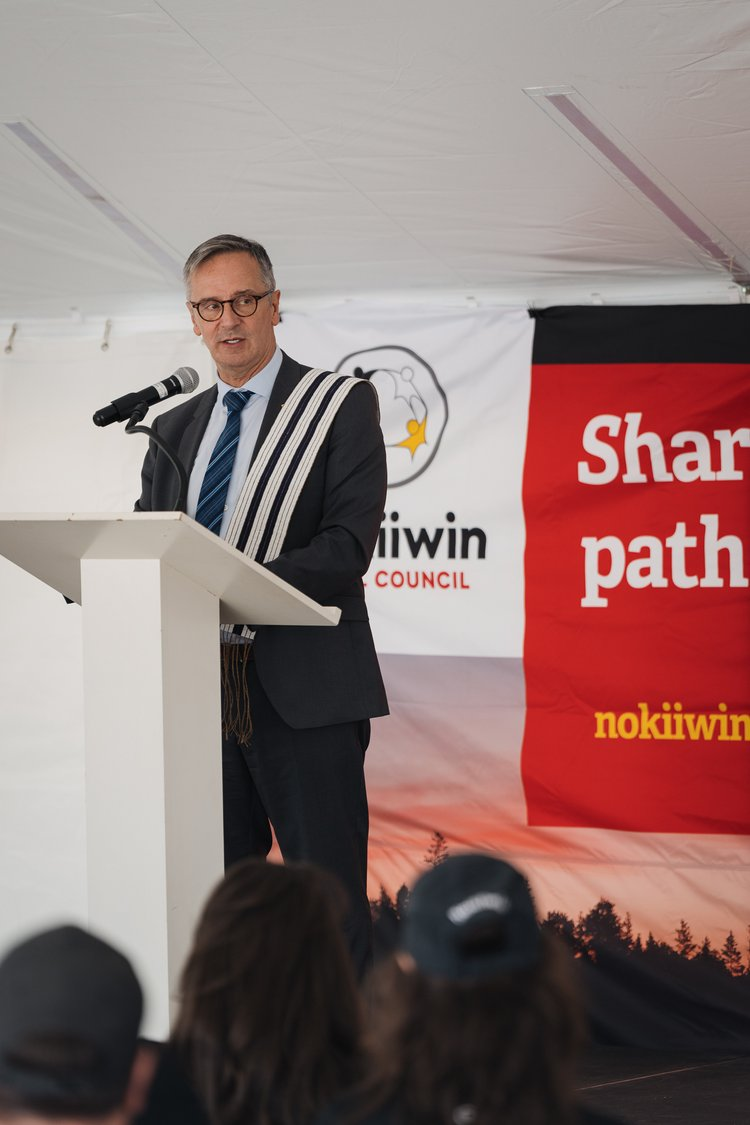In June, Glendon College Principal Marco Fiola returned from Nokiiwin Day in Thunder Bay with a gift of enduring legal and ceremonial significance: a Two Row Wampum Belt. The offering, made by Executive Director of Nokiiwin Tribal Council Audrey Gilbeau, affirms a deepening relationship between York University's Glendon College and the Tribal Council.

Fiola addressing the crowd. All photos by Chondon Photography, courtesy of Nokiiwin Tribal Council
The Two Row Wampum, or Kaswenta, is a formal diplomatic document and living treaty first recorded over 400 years ago. The agreement is governed by three principles: peace, friendship, and mutual respect. Receiving the Kaswenta is a rare and profound honour. Considered the original treaty between Indigenous civilizations and non-Indigenous peoples, it outlines a framework of coexistence between Indigenous Nations and non-Indigenous peoples.
Unbroken twin lines running the length of the beaded belt assert how each party will travel down the river of life in their own vessel: Indigenous Nations with their laws, governance, and ways of life; non-Indigenous settlers with theirs. These vessels travel side by side, never steering one another. It recognizes Glendon's position not as a leader, but as a guest in a relationship shaped by Indigenous community.
In a powerful gesture, Gilbeau presented Fiola with the striking white and purple belt during Nokiiwin's anniversary event. The day was sunny and bright, with around 200 people gathering to enjoy family-friendly games and a community barbecue. Attendees were in a festive mood. The Council was celebrating 19 years of work in support of First Nations self-determination, healing and capacity-building, serving five First Nation communities.
"To receive the Two Row Wampum Kaswenta is not something I take lightly," said Fiola, speaking to the crowd seated under the big white special events tent. "This is not a gift in the usual sense. It is a teaching, a responsibility, and a reminder of the path we have agreed to walk side by side, never crossing into the other's canoe, but travelling together."
Glendon College reciprocated with a cedar tree. Considered a medicine plant in many Nations, the cedar is a living reminder that trust is not a static agreement it must be tended over time. The tree is set to be planted at the Nokiiwin office, along with a plaque, where it will continue to grow across generations.
Glendon's collaboration with Nokiiwin started four years ago with the co-creation of the Indigenous Cultural Competency and Trauma-Informed Training Certificate, available through Glendon's Continuing Education. The course was developed and led by York Sociology Professor Maya Chacaby (Anishinaabe, member of Opwaaganisiniing / Red Rock Indian Band, Beaver Clan). Since its inception as a community-driven initiative, over 700 learners have participated in the program. Of them, more than half identified as Indigenous. "It is not often that a university can say that its largest Indigenous student cohort emerged from a course designed with and for Indigenous Nations," Fiola later added.
This is not a gift in the usual sense. It is a teaching, a responsibility, and a reminder of the path we have agreed to walk side by side, never crossing into the other's canoe, but travelling together
Fiola
The exchange underscores the certificate program's role in advancing reconciliation through community-based, culturally grounded education. Shaped by Indigenous knowledge systems and guided by community priorities, the certificate course has grown to become one of York University's largest Indigenous education offerings. It represents a shared commitment to the kind of cross-institutional alliance that is as uncommon as it is impactful.
"This partnership reflects what's possible when Indigenous governance leads," said Gilbeau, who also spoke at the ceremony.
"Over the past four years, Nokiiwin has shaped Glendon in ways that cannot be overstated. Through your leadership, our programs have evolved, our vision for Indigenous education has deepened, and our understanding of how to be in true relationship with Indigenous communities has grown. You have transformed the learning environment at Glendon," said Fiola. "It is because of your leadership that we have been able to walk this path with integrity."
In addition to the certificate, the partnership also encompasses the Nokiiwin Spirit Builder apprenticeship model used to train community-based facilitators who now deliver the course. There is also a Dungeons & Dragons-style Anishinaabemowin immersion game piloted at Glendon and available through the Tribal Council. Beyond that, there's the development of an Indigenous-led metaverse project Biskaabiiyaang, led by co-investigators Chacaby and Rebecca Caines, an assistant professor in theatre and creative technologies at York's School of the Arts, Media, Performance & Design. The partnership is one rooted in language revitalization, trauma-informed education and community-led innovation.
"For Glendon, receiving the Kaswenta means stepping further into accountability. It means continuing to uphold the agreements we've made not just on paper, but in practice, with humility, clarity, and care," said Fiola. "To Maya, to Audrey, to the communities Nokiiwin serves miigwech for your guidance and your trust. It has changed how we work, how we teach, and how we understand our responsibilities."
Nokiiwin Tribal Council serves five First Nation communities: Animbiigoo Zaagi'igan Anishinaabek, Biinjitiwaabik Zaaging Anishinaabek, Bingwi Neyaashi Anishinaabek, Netmizaaggamig Nishnaabeg and Fort William First Nation. The Council supports holistic community development through governance, legal support and cultural resurgence.
Glendon College, part of York University, is the only fully integrated bilingual faculty of its kind in Canada and one of the only university campuses specializing in liberal arts education. Students take courses in English, French, or both and, increasingly, Indigenous languages.












